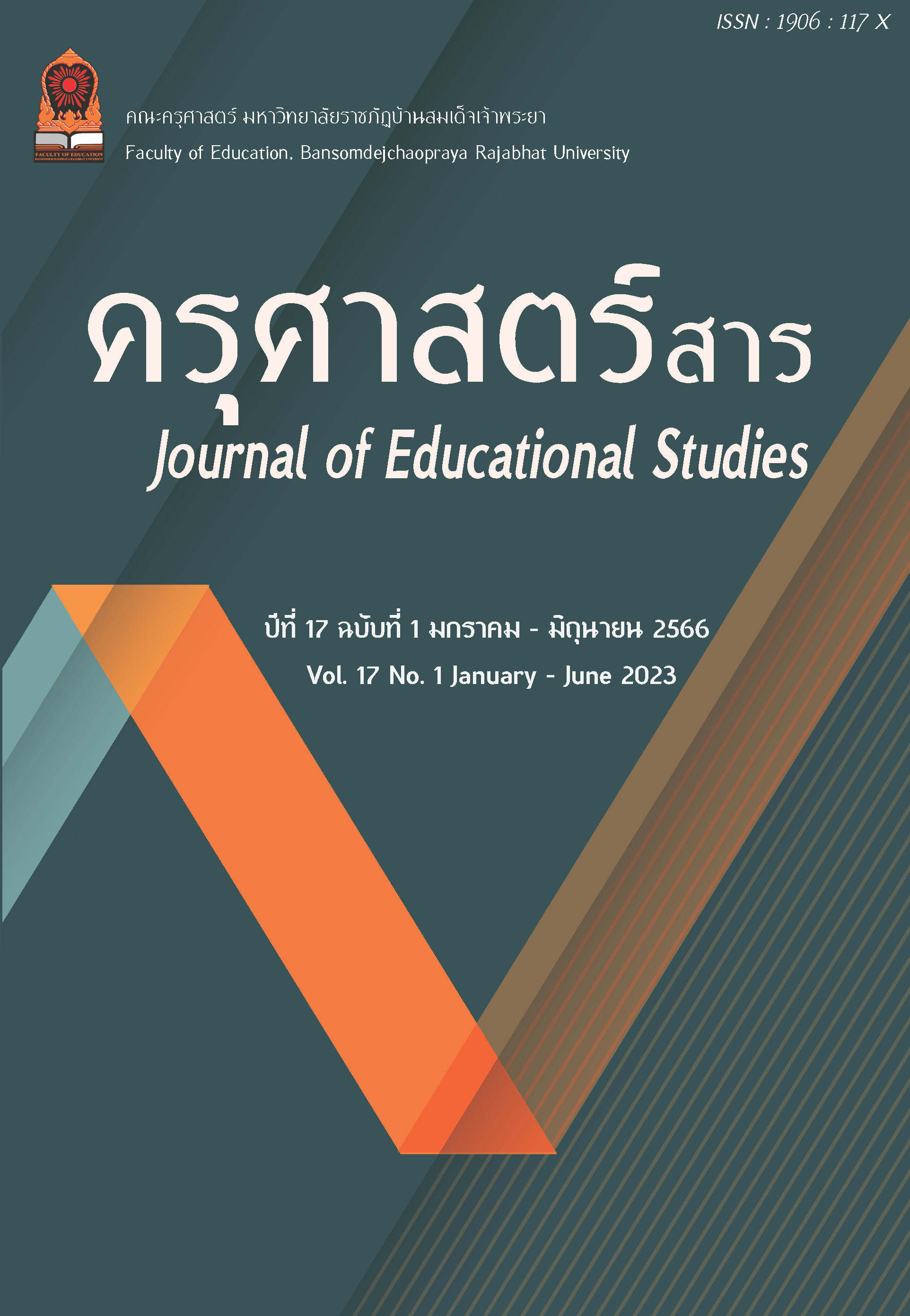The Leadership of Educational Institution Administrators Effective Organizational Development
Keywords:
Leadership, School Administrators, Organization Development, EfficientAbstract
This article aims to present the concept of leadership in school administration and its impact on effective organizational development. Nowadays, it is widely believed that leaders are not born but made through various factors within an organization. Leadership can be built by using knowledge, abilities, and perseverance until the person is accepted by the organization as a leader. Therefore, it is essential to establish a relationship based on mutual influence between leaders and followers or subordinates with a goal of effecting change by reflecting shared objectives. Leadership involves the use of influence among groups of people who intend to cause change, making leaders and executives’ distinct roles. Executives are positions that are established within an organization and are authorized by position, expected to focus on control and decision-making. However, leaders exhibit the characteristics of leadership at any level and may be empowered by other means to play a broader role than the executive role. Leaders focus on group process, information gathering, giving feedback, and exercising power against others. Therefore, leadership is a critical factor in the management process itself. Leaders need to be both an art and a science, which are critical to the success of an organization, especially in the leadership of school administrators. School administrators lead the organization towards progress and unity to achieve common goals. Leadership is like a personal weapon of the executives, and leaders who are professional managers create influence and influence others. The achievement and efficiency of work determines or measures the leadership of school administrators.
Downloads
References
จอมพงศ์ มงคลวนิช. (2556). การบริหารองค์การและบุคลากรทางการศึกษา (พิมพ์ครั้งที่ 2). กรุงเทพมหานคร: สำนักพิมพ์แห่งจุฬาลงกรณ์มหาวิทยาลัย.
ธัญวิทย์ ศรีจันทร์. (2558). รูปแบบและกลยุทธ์การพัฒนาภาวะผู้นำในศตวรรษที่ 21 ของกรรมการองค์กรนิสิต. วิทยานิพนธ์ ค.ด. (อุดมศึกษา). กรุงเทพฯ: จุฬาลงกรณ์มหาวิทยาลัย.
เนตร์พัณณา ยาวิราช. (2552). ภาวะผู้นำและผู้นำเชิงกลยุทธ์ (พิมพ์ครั้งที่ 7). กรุงเทพมหานคร: ทริปเพิ้ล กรุ๊ป.
นิติพล ภูตะโชติ. (2557). พฤติกรรมองค์การ. กรุงเทพมหานคร: สำนักพิมพ์แห่งจุฬาลงกรณ์มหาวิทยาลัย.
ประยุทธ์ ปยุตโต. (พระธรรมปิฎก, 2540). ภาวะผู้นำ. กรุงเทพมหานคร : ธรรมสภา. พิชญาภา ยืนยาว. (2562). ภาวะผู้นำทางการบริหารการศึกษาและถานศึกษา. นครปฐม: มหาวิทยาลัยราชภัฏนครปฐม. (ประกอบการกำหนดตำแหน่งวิชาการ รองศาสตราจารย์ สาขาการศึกษา อนุสาขาวิชาการบริหารการศึกษา)
รังสรรค์ ประเสริฐศรี. (2544). ภาวะผู้นำ. กรุงเทพฯ: ธนชัชการพิมพ์. วิเชียร วิทยอุดม. (2554). การจัดการสมัยใหม่. กรุงเทพมหานคร: ธนธัชการพิมพ์. วิจิตร เสาวรัจ. (2565). ความแตกต่างระหว่างผู้บริหารกับผู้นำ. ออนไลน์ สืบค้นจาก https://wsaoams3.wordpress.com
วนิดา พิพัฒน์วัฒนะกุล. (2551). การศึกษาคุณลักษณะผู้นำและประสิทธิผลภาวะผู้นำของผู้บริหารสถานศึกษาตามทรรศนะของครูจังหวัดอุทัยธานี. วิทยานิพนธ์ ปริญญามหาบัณฑิต มหาวิทยาลัยราชภัฏนครสวรรค์
วิรุฬห์จิต ใบลี. (2548). ภาวะผู้นำทางวิชาการของผู้บริหารสถานศึกษา สังกัดสำนักงานเขตพื้นที่การศึกษาหนองบัวลำภู เขต 1-2. เลย: วิทยานิพนธ์. ค.ม. (การบริหารการศึกษา), มหาวิทยาลัยราชภัฎเลย.
สุทธิชัย ปัญญโรจน์. (2555). ครบเครื่องเรื่องนักบริหาร. กรุงเทพมหานคร: ส.เอเซียเพรส (1989).
สุเทพ พงศ์ศรีวัฒน์. (2545). ภาวะผู้นำทฤษฎีและปฏิบัติ. กรุงเทพฯ: บุคลิ้งค์. สุภัททา ปิณฑะแพทย์. (ม.ป.ป.). ภาวะผู้นำของนักบริหารการศึกษามืออาชีพ. สืบค้นจาก https://www.supatta.haysamy.com/leader_pro.html.
DuBrin, J. (1998). Leadership research finding: Practice and skills. Boston Houghton: Mifflin Company.
Gibson, J. L., Ivancevich, J. M. & Donnelly, J. H., Jr. (1997). Organizations, Behavior Structure Processes. United States of America: Irwin/McGraw-Hill.
Hanson, M. E. (1996). Educational Administration and Organization Behavior (4th ed.). Boston: Allyn and Bacon.
Hersey, P & Blanchard, K.H. (1993). Management of organizational behavior: Utilizing human resources (6th ed.). New Delhi: Prentice Hall of India.
Kotter, J. (1990). A Force of Change: New Leadership Differs from Management. London: Macmillan.
Nethercote, R. (1998). Leadership in Australian University. Colleges and Halls of Residence: A Model for the Future. Unpublished Doctor of Education Thesis, The University of Melbourne, Parkville.
Nelson, D. L. & Quick, J. C.(1997). Organization Behavior (2nd ed.). New York: Harper and Row.
Pursley, R. D., and Snortland, N. (1980). Managing government organizations. North Scituate, MA: Duxbury.
Robbins, S. P. (2000). Organizational behavior (9th ed.). New Jersey: Prentice Hall.
Robert L. Katz (1983). Executive Success Making If in Management. New York: John Wiley and
Sons.
Stogdill, R.M. (1974). Handbook of Leadership: a Survey of the Literature. New York: Free press.
Trimble, S. and Miller, J.W. (1996). “Creation, Invigoration and Sustaining Effective Teams. (Personalizing the High School: The Most Important Reform),” NASSP Bulletin. 2 (4): 40.
Yukl, G. A. (2010). Leadership in organizations (7th ed.). New Jersey: Prentice - Hall.
Downloads
Published
How to Cite
Issue
Section
License

This work is licensed under a Creative Commons Attribution-NonCommercial-NoDerivatives 4.0 International License.
บทความที่ได้รับการตีพิมพ์เป็นลิขสิทธิ์ของคณะครุศาสตร์ มหาวิทยาลัยราชภัฏบ้านสมเด็จเจ้าพระยา
ข้อความที่ปรากฏในบทความแต่ละเรื่องในวารสารวิชาการเล่มนี้เป็นความคิดเห็นส่วนตัวของผู้เขียนแต่ละท่านไม่เกี่ยวข้องกับมหาวิทยาลัยราชภัฏบ้านสมเด็จเจ้าพระยา และคณาจารย์ท่านอื่นๆในมหาวิทยาลัยฯ แต่อย่างใด ความรับผิดชอบองค์ประกอบทั้งหมดของบทความแต่ละเรื่องเป็นของผู้เขียนแต่ละท่าน หากมีความผิดพลาดใดๆ ผู้เขียนแต่ละท่านจะรับผิดชอบบทความของตนเอง



